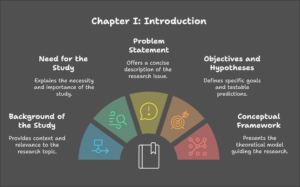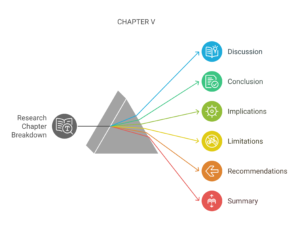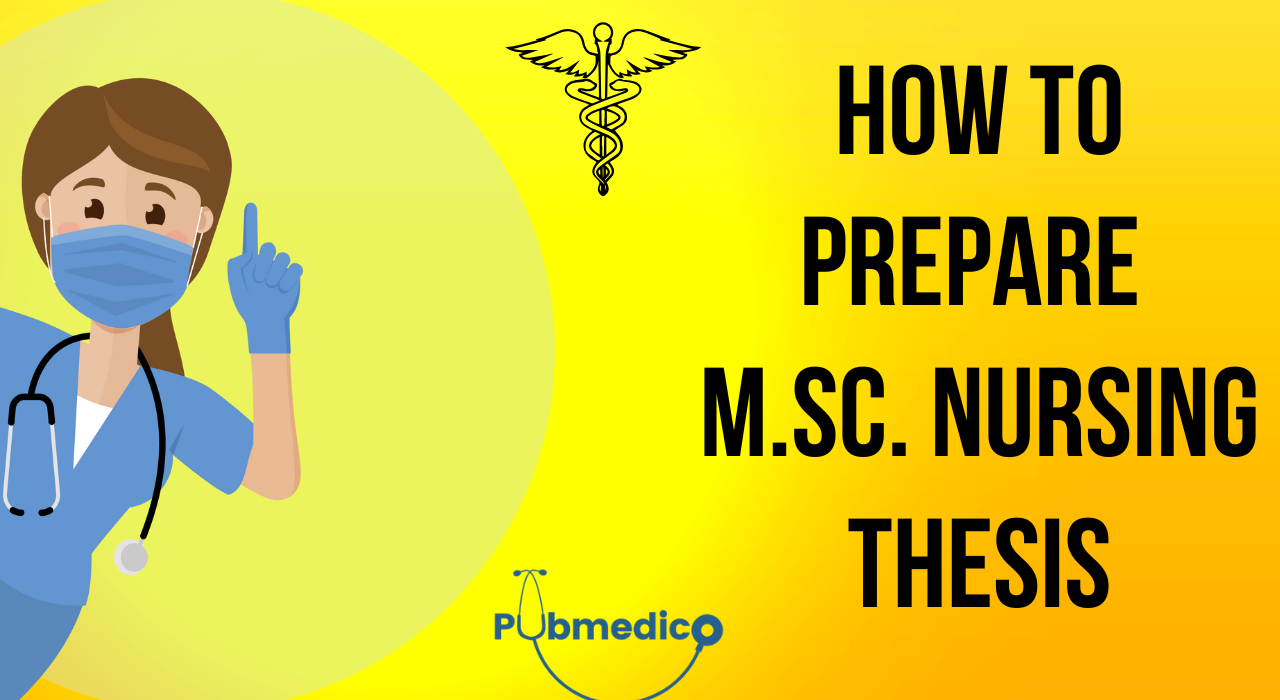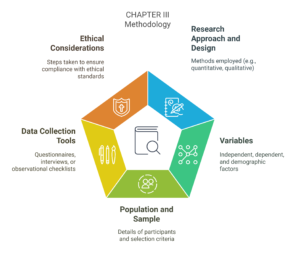How to Prepare an MSc Nursing Thesis
How to Prepare an MSc Nursing Thesis
An MSc Nursing thesis is an extensive academic work that reflects a student’s research capabilities, subject mastery, and potential contributions to the nursing field. It requires careful planning, a solid understanding of the research process, and adherence to academic standards. This guide will help you navigate each section of the thesis, providing insights into the purpose and structure of every chapter.
If you need help in your thesis Contact Us
Front Matter (10–15 Pages)
The front matter serves as the introductory section of your thesis, setting the tone and providing essential details.
1. Title Page (1 Page)
- Include the thesis title, author’s name, institution, degree program, and submission date.
- Ensure the title succinctly reflects the research topic and scope.
2. Certificate/Declaration (1–2 Pages)
- A formal statement of originality and compliance with institutional research ethics.
3. Acknowledgment (1 Page)
- Express gratitude to mentors, peers, and institutions that supported your research.
4. Abstract (1–2 Pages)
- Provide a concise summary of the research, including objectives, methodology, findings, and conclusions.
- Keep the abstract within 250–300 words.
5. Table of Contents, List of Tables, and Figures (5–8 Pages)
- Create a structured list of all sections and subsections.
- Number and label all tables and figures accurately.
Chapter I: Introduction (12–15 Pages)
Chapter I: Introduction (12–15 Pages)
The Introduction chapter provides the foundation for your MSc Nursing thesis, explaining the rationale, context, and scope of the study. It ensures that readers understand the significance of the research and what the thesis aims to achieve. Below is a detailed breakdown of the sections within the chapter:
1. Background of the Study (3 Pages)
- Explain the topic’s relevance and its significance to nursing practices and policies.
2. Need for the Study (4 Pages)
- Highlight gaps in existing literature and the importance of addressing them.
3. Problem Statement (1 Page)
- Define the specific issue your study seeks to resolve.
4. Objectives and Hypotheses (1 Page)
- List clear, measurable research objectives and hypotheses.
5. Operational Definitions (1 Page)
- Clarify key terms and concepts used in the study to ensure consistency.
6. Conceptual Framework (2 Pages)
- Detail the theoretical foundation guiding the research, often represented visually.

Chapter II: Review of Literature (20–25 Pages)
The Review of Literature chapter is a critical component of your MSc Nursing thesis. It synthesizes existing research, identifies knowledge gaps, and establishes the theoretical foundation for your study. This chapter provides context for your research question and demonstrates your understanding of the current state of knowledge in the field.This chapter synthesizes existing research to establish the theoretical and empirical context for your study.
1. Prevalence and Context (10 Studies)
- Summarize epidemiological data and contextual trends related to the topic.
2. Knowledge and Practices (10 Studies)
- Discuss findings from studies on nursing knowledge and practices.
3. Intervention Effectiveness (10 Studies)
- Analyze studies evaluating similar interventions or methodologies.
Organize Studies Systematically
- Use subheadings to group studies by themes or methodologies.
Chapter III: Methodology (10 Pages)
The Methodology chapter outlines the research design and methods used to conduct your study. This chapter ensures transparency, allowing others to understand and replicate your work. It is the blueprint for your research, detailing the steps taken to gather, analyze, and interpret data.This chapter outlines the research design and methods, providing transparency and replicability.
1. Research Approach and Design
- Specify whether your approach is quantitative, qualitative, or mixed-methods.
2. Variables
- Identify independent, dependent, and demographic variables.
3. Population and Sample
- Define the target population, sample size, and selection criteria.
4. Data Collection Tools
- Describe instruments used (e.g., questionnaires, interviews) and their validation process.
5. Ethical Considerations
- Detail compliance with ethical guidelines, including participant consent and confidentiality.
6. Data Analysis Plan
- Specify statistical or thematic techniques for analyzing data.
Chapter IV: Results and Analysis (25–30 Pages)
The Results and Analysis chapter presents the findings of your study, derived from the data collected during your research. This chapter is purely factual and avoids interpretation or discussion of the findings. Instead, it focuses on presenting the data clearly and systematically, often using tables, graphs, and charts to support the narrative.Present your findings using a combination of descriptive summaries, tables, and graphs.
1. Demographic Data
- Display participant demographics using charts or tables.
2. Key Findings
- Present findings aligned with your objectives and hypotheses.
- Use visuals to enhance clarity and engagement.
3. Statistical Analysis
- Report statistical tests, results, and significance levels.
4. Interpretation
- Provide initial interpretations without delving into broader implications.
Chapter V: Discussion, Conclusion, and Recommendations (10–12 Pages)
The Discussion, Conclusion, and Recommendations chapter is where you interpret your findings, connect them with the existing body of knowledge, and provide actionable insights. This chapter evaluates the implications of your results and concludes the research while suggesting areas for future studies or practical applications.This chapter interprets findings, links them to existing literature, and outlines practical implications.
1. Discussion
- Compare your findings with previous studies.
- Address inconsistencies and explore potential explanations.
2. Conclusion
- Summarize the study’s major contributions and their significance.
3. Implications
- Discuss practical applications in nursing practice, education, or policymaking.
4. Limitations
- Acknowledge constraints such as sample size or methodological issues.
5. Recommendations
- Suggest areas for future research or improvements in nursing practice.
6. Summary
- Recap the research purpose, key findings, and conclusions.

Additional Sections
1. Bibliography
- List all references in an appropriate academic style (e.g., APA, MLA).
2. Appendices
- Include supplementary materials like raw data, consent forms, or questionnaires.
Tips for Writing a Successful MSc Nursing Thesis
- Start Early: Allocate enough time for each section.
- Stay Organized: Use reference management software for citations.
- Seek Feedback: Regularly consult with your advisor for guidance.
- Edit Thoroughly: Proofread for clarity, coherence, and grammatical accuracy.
- Follow Guidelines: Adhere to institutional formatting and submission requirements.
Completing an MSc Nursing thesis is a significant milestone in your academic journey. With careful planning and dedication, your research can make a meaningful contribution to the nursing field. Good luck!
Frequently Asked Questions (FAQs) About Writing an MSc Nursing Thesis
Below are some commonly asked questions and their answers to guide you through the process of writing your MSc Nursing thesis.
1. What is the main purpose of an MSc Nursing thesis?
The thesis allows students to:
- Demonstrate their ability to conduct independent research.
- Contribute to the field of nursing by addressing knowledge gaps.
- Develop expertise in a specific area of nursing practice or education.
2. How do I choose a topic for my MSc Nursing thesis?
- Select a topic that interests you and aligns with your career goals.
- Identify gaps in the existing literature or current challenges in nursing practice.
- Discuss potential topics with your academic advisor to ensure feasibility.
3. What should I include in the Introduction chapter?
The Introduction should include:
- Background of the study to set the context.
- The need for the study to justify its relevance.
- A clear problem statement, objectives, and hypotheses.
- Operational definitions and a conceptual framework to guide the research.
4. How long should each chapter be?
- Front Matter: 10–15 pages.
- Chapter I (Introduction): 12–15 pages.
- Chapter II (Review of Literature): 20–25 pages.
- Chapter III (Methodology): 10 pages.
- Chapter IV (Results and Analysis): 25–30 pages.
- Chapter V (Discussion, Conclusion, and Recommendations): 10–12 pages.
5. What types of research designs are commonly used in MSc Nursing theses?
- Quantitative: Experimental, quasi-experimental, descriptive, or cross-sectional designs.
- Qualitative: Phenomenological, ethnographic, or grounded theory studies.
- Mixed-Methods: Combining quantitative and qualitative approaches.
6. How do I ensure my thesis adheres to ethical guidelines?
- Obtain approval from your institution’s ethics committee.
- Ensure informed consent from participants.
- Protect participant confidentiality and data privacy.
- Follow protocols for data collection and storage.
7. What is the best way to structure the Review of Literature?
- Group studies by themes (e.g., prevalence, interventions, outcomes).
- Highlight gaps and inconsistencies in prior research.
- Use a logical flow to build the rationale for your studyhttps://graduate.rice.edu/academics/candidacy-defense-thesis-submission/thesisformat





